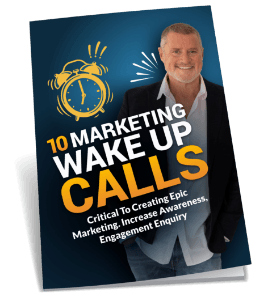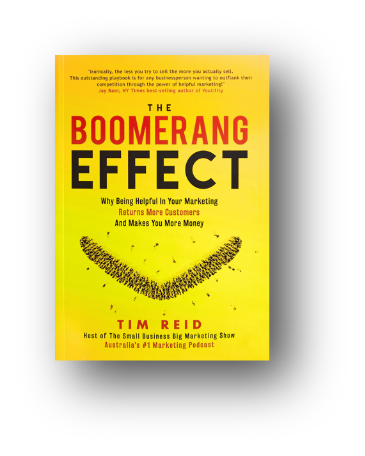Tim: Lukie, Lukie, Lukie.
Luke: How are you Tim?
Tim: I am excellent, thank you and welcome back listeners to another episode of Small Business Big Marketing, Lucas?
Luke: Thank you to Flying Solo listeners. FlyingSolo.com is Australia’s biggest online small business forum.
Tim: Lukie? Sorry to interrupt you there. I am very excited.
Luke: It’s all right. It’s something you do regularly, some of our listeners tell me.
Tim: Quite practiced aren’t I?
Luke: You are.
Tim: Lucas, without revealing whom; we have just interviewed Australia’s . . .
Luke: Well, we revealed who he was in the last episode.
Tim: Oh, did we?
Luke: So we might as well tell the listeners.
Tim: Did we do that?
Luke: We did.
Tim: All right. Okay.
Luke: So, in a few moments we are going to be talking to Harold Mitchell today.
Tim: A.O.
Luke: A.O.
Tim: Order of Australia.
Luke: Yes.
Tim: Would A.O. be O.A.? It is A.O. isn’t it? But anyway, he’s been given a gift by the Queen, and wow, biggest media planner in Australia, friend of Mr. Pecker, Mr. Middle, Mr. You Name It.
Luke: Yes, he is.
Tim: He’s going to spill the beans on what is happening with the world niche media. Anyway, enough of that. We will come back to Harold Mitchell because we have a bit to cover. We have a listener question.
Luke: We do have a listener question.
Luke: And the Prof is going to cover, do you know what he is going to cover? He is going to slam social media.
Tim: Yeah, he is.
Luke: Well, he’s not slamming it.
Tim: Well, he’s not slamming it.
Luke: No.
Tim: He’s giving a different point of view.
Luke: He is. He is giving a good point of view.
Tim: Question?
Luke: Yes.
Tim: Do you want to get stuck into that?
Luke: Before we do, I would just like to say thank you to Kelly Exeter from Swish Design. We did a listener profile on Kelly on a blog recently, so you have to go to SmallBusinessBigMarketing.com and check that out.
Tim: We are doing listener profiles, and maybe we can put a shout out to any listeners who want to profile their business on our blog. We have a series of questions that you are required to answer, all about your marketing, your best marketing efforts.
Luke: Yes.
Tim: If it is up to scratch, we will post it.
Luke: Yes. We will also drop in a link to your website as well.
Tim: Yeah, which our website has got a bit of Google juice attached to it, hasn’t it?
Luke: It has.
Tim: It’s got power.
Luke: It has been around a while. So yeah.
Tim: It’s been around. Now Lucas, this is an email we got from Ingrid who is a chiropractor. She is basically asking . . . well, I’ll abbreviate the question. She has had a chiropractic business with a partner and she wants to know how to increase patient numbers. Okay?
Luke: Yeah.
Tim: Increase sales basically. We have put ourselves on natural therapy page. She has a website. It’s not ranking high at the moment. She has done flyers. She has done gift vouchers. She has gone to local businesses and tried to do a bit of a joint venture. Nice idea.
Luke: Good idea.
Tim: She is getting a bit of repeat business, and has had two referrals so far. But she wants to up it.
Luke: Yeah.
Tim: She wants to just put this chiropractic business on steroids, Lucas, and you and I are going to go one-for-one on some ways that we think she can drive a bit more traffic. Do you want to start?
Luke: Okay. Well, I think some of our listeners are going to think I am a one-trick pony.
Tim: Here we go.
Luke: AdWords.
Tim: You love your AdWords.
Luke: I would be setting up a local AdWords campaign. And I have actually done a recent blog post around that. So if you want to go ahead and check out SmallBusinessBigMarketing.com, it shows you a little bit about how to set up a locally targeted AdWords campaign.
Tim: We will put a link to that in the show notes for episode, I think this is 78, and so we will link to that. It is a good blog post, Lukie.
Luke: Yes, so there is a way in AdWords that you can actually target people within a certain radius of your business. So you might be targeting people up to 20 kilometres away. It just means that you get highly targeted, focused clicks on your ads, and therefore you are not spending a fortune.
Tim: No wastage.
Luke: No wastage. Tim, what’s your?
Tim: Okay. She is trying to be the chiropractor to anyone right now by the sounds of things.
Luke: Yes.
Tim: You know what I am going to say, don’t you?
Luke: I know where you are going with this.
Tim: Niche it down.
Luke: Absolutely.
Tim: This is very close to my spine, Luke.
Luke: Yes.
Tim: For long-time listeners, about six months ago I had spinal surgery, had a disc replaced in my spine actually. As it was the result of too much computer work, so my neurosurgeon said. Have you got a neurosurgeon?
Luke: No.
Tim: Now I have. He said, “Too much computer work, Timmy.” Now, subsequent to that, I have heard so many people say to me, “Oh my god, working at the computer is killing me.”
Luke: Yeah.
Tim: And you know what? It actually is. I’ve been looking at my kid’s posture, and the kids these days, digital natives, are living on the computer. Their head and neck is tilting forward in a very unnatural way. So my advice to Ingrid is to put y our hand up and be known as the chiropractor in something.
Luke: Yeah.
Tim: I am not suggesting it be the chiropractor who can change computer users’ lives around, although I reckon that would be a pretty good one. But be the chiropractor for pregnant moms or whatever it is. Lukie?
Luke: There is someone who listens to our show, or used to anyway, Luke Van Every, who is known as The Shoulder Guy. He is a physiotherapist, and he focuses purely on shoulders. We met Luke when we were out at the [James 05:48] conference last year. If you do a search on Google for “The Shoulder Guy,” you will be able to find his website. It is actually TheShoulderGuy.com.au. Go and have a look at what works there. I think he has quite a good base of customers.
Tim: Right. Was that your idea? Or was it mine?
Luke: That was your idea.
Tim: My idea?
Luke: That was your idea.
Tim: That was my idea.
Luke: I think in carriage and reward referrals. So if your existing customer base refers people, try to reward them in some way.
Tim: There it is. Okay, good one. Ding. There is a chiropractor near the city, in Melbourne, and it has been there for years and years. They have got a big statue of a spine out in front. It is on Victoria Parade, just for local listeners, Victoria Parade in Abbotsford.
Luke: Yes.
Tim: Have you seen it?
Luke: I think so.
Tim: Oh man, it is just so obvious. So, while it might be expensive to get a large spine constructed, actually it would be a really good idea. At least have really good, strong straight signage and tell people. Having a signage is not the answer. But what is the message on that signage and putting your hand up as being the Chiropractor to the Stars or whatever it is. You are looking at my notes?
Luke: I am looking at your notes, email interest, Timbo.
Tim: Okay. Yeah, well that is a problem. It is not a game winner.
Luke: No.
Tim: What is your problem?
Luke: It does come down to branding.
Tim: Okay.
Luke: It is a hotmail address.
Tim: How many hotmail addresses are there? Ingrid, get an address that has your business name.com.au. That was your idea. So it is back to me. She said her website is not ranking. It is only three to week, but it shouldn’t be so hard to rank locally. I am going to get geeky, but she needs to get clarity around her keywords.
Luke: Yes.
Tim: And then get them into her meta data, which basically, go ahead and tell your web developer to do that. We won’t explain it here, but we do explain it in our product Site Boost, which if you go to our Products page on Small Business Big Marketing, you will see our product Site Boost, which basically shares the characteristics of high performing websites. Lukie, what is yours?
Luke: Yeah, I was just going to follow up on that. We are not sure where Ingrid is. But if she is in a suburb, then she probably wants to try and do some SEO around chiropractor and then suburb name.
Tim: Absolutely, she would. A couple more before we get stuck into the Harold Mitchell interview. Testimonials, she is getting some repeat business. You better capture those as testimonials. Post them on YouTube, post them on the website. Make sure they are well described and tagged back to suburb specific chiropractor, and she will get a bit more Google juice.
Luke: Yes.
Tim: Got one more?
Luke: We have one more, and I think I have actually done a bit of a rant on one of our previous episodes, Timbo, with the experience I have with my chiropractor and dentist. Make sure you follow up on customers that have been to you already. Look, I know you are probably in the early days of your business, but always follow up with them to see how they are going, and obviously get that repeat business. I know that I have had experiences where I have not been able to attend a particular session with a chiropractor., and basically they’ve just let me drop off their radar. They haven’t rung back to try and get me back again at some other time. So make sure you always follow up with the customer.
Tim: Ingrid, thank you for your question. To all chiropractors, if you implement any of those ideas and get results, let us know, questions@SmallBusinessBigMarketing.com. If you implement them and don’t get results, tell someone else.
Luke: Absolutely.
Tim: Okay, Lukie, it is time for the Prof to have a crack at social media.
Prof: What is the case against social media? Is social media everything it is hyped up to be? As much as I am a fan of social media and I believe in its long-term potential, I think it is important to take a balanced perspective and to look at the arguments on either side of the fence.
Firstly, let us look at some statistics. 89% of the world’s population is not on Facebook. For every one Facebook user, there are eight non-users. There are only 225 million Twitter users. Twitter has 92% awareness amongst Internet users, but only 8% usage. There is a lot of activity around social media on the part of companies, lots of strategies and campaigns, but the results have been ambivalent and less than convincing so far, as a generalization. Of course, there have been some exceptions.
Things like liking a brand on Facebook or following a company on Twitter is it really a measure of commercial success? I am not sure. I think perhaps it says more about the person than it actually says about the company or their relationship with the company or their intention to purchase from the company.
Like the Internet, social media is definitely a double-edge sword, and it has a lot of social and psychosocial negative consequences. Some examples, of course, would include something that is in the headlines right now, cyber bullying. I think also real world, offline relationships are suffering as a consequence of social media. I would love someone to do a study on lost productivity in the workplace as a result of employees engaging in social media when they are supposed to be working.
Then, I think that the Internet is making us intellectually lazy. We are not putting in the effort to do research, to verify, to check that perhaps we used to in the good old days of encyclopaedias, etc.
Another unintended consequence of social media is attention fragmentation. People are simply splitting their attention across too many activities, and the quality of their attention devoted to any one activity has to suffer as a result.
That is my articulation of the cons, if you will, of social media. Next, I will address the case in favour of social media and the advantages of social media.
Tim: Lucas, put that in your intellectual, academic pipe and smoke it, my friend.
Luke: I don’t think my pipe is big enough.
Tim: Now Luke, Harry Mitchell, never call him Harry, Mr. Harold Mitchell, A.C. I got it wrong earlier. It is A.C.
Harold: Yes.
Tim: Not A.O.
Harold: No.
Tim: Okay. Don’t know what A.C. stands for. But son of a saw-miller who subsequently built a media empire in Australia, the biggest media buying and selling agency in Australia, has been kind enough to join us for a bit of a talk about how niche media is impacting on the big guys.
Luke: Yes.
Tim: Over to Harold.
Tim: Hello, Harold.
Harold: How are you?
Tim: Good. How are you? It is Tim here and Luke as well.
Luke: Good day, Harold, thanks for joining us.
Harold: It is no trouble.
Luke: Welcome to Small Business Big Marketing.
Harold: Thank you.
Luke: Harold, before we get into the serious stuff, we were Googling you, a picture of you early this morning, and on the second row came up a picture of George Clooney.
Harold: No. No. So why are you interviewing me if you can get George?
Luke: Well, I juts think that is very impressive, and we clicked on it, trying to figure out why.
Harold: What was the second row? What was that all about I wonder?
Luke: Well, when we say second row, it comes up row upon row of pictures of Harold Mitchell, but in the second row . . .
Harold: Oh, right. I don’t know about that.
Luke: Oh well, anyway, now serious stuff. Thanks for joining us. An important interview for us and our listeners, because we are obviously a creator of niche content in the media. We happen to be Australia’s number one marketing podcast for small businesses, but we are a niche player. I was sitting with my 12- year-old daughter only a few nights ago, and we spent about two hours on YouTube and in iTunes. I thought that previously we would have been watching TV and consuming advertising. I’m really interested to understand what your view is on this whole impact niche content is having on mass broadcasters.
Harold: Well, a number of things, it is probably the biggest change that we have known in any of our lifetimes. It might well be as big a change since the development of the printing press. That all sounds a bit grand and when we learn that when we look back at it. What has really happened is that the form of communication, which began with printing, suddenly managed to go one-to-one. We’ll print something and we’ll hand it out and that becomes communication. It was the beginning of mass media over many years. That was the basis of what we have been dealing with mass media, newspapers, magazines, radio, television, etc. One thing happened, the message went out and you were not quite sure it was getting. Research will show us a lot later on. But it was a mass market and there were mass products, mass markets and mass media. That was the world. It was also one way, that is you sat down and you watched the television or you listened to the radio.
2004, the greatest change we’ve ever known, which is the beginning of the Digital Age, and this has brought the change that you just now talked about with your daughter. What happened from 2000 on was that the world became the world of the individual, and that became so important you didn’t have to deal with mass markets anymore. You could work out just who that individual was, and you could communicate with them and in doing that it was now two-way in that you could press the red button if you like and you could then interact. Previously it was always, I see the ad, I get the message, I would go down to the store or try and call, or I’ll read the catalogue, but I will respond differently. Now it is a complete inter-reaction and not only that you describe measurability.
What we are seeing is, in a space of just 12 years, the advertising market has responded tremendously to this. It is now probably 20% of all of our dollars is involved with digital media. Now, it took television, the storm to survive through the 20th century, it took television 25 years to get to the same level. That is just how big the Digital Age is and what it will be from here. Many are now finding out how to deal with it. First, we have the big publishers. That is a very major deal, in terms of what they are, what they are doing. It took them some time, understandably, to say that the world was changing, not uncommon.
When you saw the first motorcars, it was essential that someone walk in front of the motorcar holding a big flag, because it was something new and dangerous. The steam engine, people said no, no, no, it will be here forever all these other diesel things are not going to happen. That was the world of what that was all about, a very big difference in every way.
This is the new world that we live in. What does it mean to the old world of the media? It doesn’t mean that it ends. It just means that it changes. We know that people spend over seven hours a day with the media in various forms. That is a massive amount of their time. They still consume television, [inaudible 17:34] television in different ways.
Tim: Where does that seven hours come from, Harold? How is that seven hours accounted for?
Harold: There is sufficient research to say what did you do today. Some of it is part of the regular [inaudible 17:47] which is all of the audience measurement detail, for both radio and television. There are separate ways of reading the readerships of newspapers, magazines, [inaudible 18:02] assessment and what you were doing to have contact with advertising. So it has been that way for a long time. People have got a lot of spare time. What are they going to do with it? The media has filled that gap over most of the 20th century in different ways. It is changing, but it is not changing so dramatically, but nevertheless changing. People don’t watch regular television as much anymore, of course. Radio varies. They used to listen to AM. Now they listen to FM. Newspapers are changing in the actual circulation is going down, but they happen to be reading the newspapers as much or nearly more online. So that is the changing nature of the world. It is the biggest change that has happened in our lifetime. And no one will know until we look back after a long period of time to say this was the greatest change that ever happened ever.
It does mean challenges across a whole range of people. Firstly, to your daughter, how old is she? 12 you said?
Tim: 12, yes.
Harold: 12. No problems at all. She has only known this new world, and to her this is fantastic and this is the way it is. So any wonder that a 12-year-old can pick up a telephone, a mobile phone and can handle it better usually than her parents, because that is creating a new world of learning and understanding, and the fact that she increasingly demands flexibility and mobility, and these new devices will give it. That is the change that is taking place.
In 2000, we started a digital business. Somehow we worked out that this was going to happen. Google was one year old. Rupert Murdoch of News Corp was still saying it couldn’t quite work. Mind you, to his great credit, it was not too many years later he swung the whole of News Corp behind it, and now it is catching up very fast. But others came along, this new world, where phone companies got involved, the mobile phone is going to be one of the greatest ways of communicating with people into the future. These changes are there and before us.
Tim: There’s even discussion of the mobile phone becoming where your mobile phone statement becoming your bank statement?
Harold: It will be more. It will be everything if you want it to be. It will be where you go to the next [inaudible 20:17] or to the next [inaudible 20:20] to think what to record. There are now over 24 million mobile phones. People are so involved in all of it ,that it is incredible. The smart phones have changed in a different way. 46% of smart phones owners use them to watch TV. 43% listen to music. It’s nearly 20% browse newspapers on them and [inaudible 20:43] now read their books.
Tim: Harold, we have a segment on our show, which is hosted by the head of marketing, Professor Mike Ewing at Monash University. In the last segment, he talked about this concept of simultaneous media consumption and attention fragmentation. It is just so interesting. I mean, Stephanie and I, we’re 100% focused on YouTube and iTunes. But what I am also seeing, and even if I look at myself, and I don’t watch a lot of TV, but if I do, I generally have the iPad in the hand and am consuming something else as well. The question is where is people’s attention these days? Is it leaning in to the screen or is it reclining back on the rocker watching the television?
Harold: Well, it is in many different ways, which means the attention span, as we all know from all the young people now, is much shorter. And it brings the next challenge, which is about content. That is, you can’t rely on anything anymore because people will it. There was a time when what you were going to watch on the television was what you hated the least, as you all agreed to watch whatever it was usually what Mum wanted. But not anymore because you can go up to the bedroom and you can watch any device that you want, even in another room. You can go out into the garden and watch with all of the mobility of it. And so, if you are a bit bored with something, you will swap to something else. If you have to wait 20 seconds for something to load, you say [inaudible 22:03] much. And so what is now important is content and maybe that has always been the case.
This raises, as I said, challenges in many ways. One is for media owners. Two are great advertising opportunities, which are different to what they were in the past, because in the past they were simply, we will create an ad and we will slot it in to 30 or 60 seconds and people will watch it. Well, not anymore. The contact with the customer is in just so many different ways that are just so important and different. That is it.
Retailing has changed dramatically as you know, because you actually don’t have to go to the store. There was a time where people in retail said, “No, no, they want to feel it and try it on.” Everyone knows they’re size a [ten, if they’re a size ten.] They can look at the colours from somewhere else. They can make up a montage of what it is going to be with other parts of whatever they are wearing. They can push another button and order it from somewhere in New York.
All of that is the new and changing world. So the challenge is ahead, which it says draw the line, understand that this is a digital world we’re going to live in. By 2020, 80% of all media will be delivered digitally, and that is what it will be. It does mean that there has just been an absolute explosion of the channels that are there. So the word niche media doesn’t exist anymore. If what you have to do is sell 8,000 of your particular European model car in Australia this year and 8,000 will do it and that is all you need to do, why on earth do you need to be on a television show with an audience of just over a million. In that case, you don’t. If you can find somewhere that there are those 8,000 people, they are the only ones you want, that is a niche media. To anybody that is really big time targeting, and that is the importance of the future.
So the next challenge is to marketers, to understand that the world of the individual has arrived. There was a time when if you had a Mercedes-Benz 25 years ago, people knew what you were talking about. You either had a black one or a white one, but it was a Mercedes-Benz. That was the car. Now there are 50 different models of Mercedes at the very least, which can be fashioned in so many different ways. That is the world of the individual. That is what it will be into the future.
Tim: Harold, that is really interesting and reassuring for us as podcasters, although Luke and I can’t wait until 2020. We want to start making money now.
Luke: Yeah, have you guys got your own?
Tim: We are out there looking for a big brand. We have a show that is listened to by very motivated, passionate small business owners, and lots of them. We are knocking on the doors of big brands that we think would be an ideal partnership with us, and they are just not getting it. They are not getting that here is a piece of niche content that is highly targeted, where we have very motivated listeners. But they are like, some of them are like, “What is a podcast?” Others are like, “Well, it is not big enough for us.”
Luke: We do find it frustrating because there are a lot of, particularly the big banks, the likes of Zero, NYB, that are after the eyeballs of small businesses. There are a lot of people after the small business dollar.
Tim: Yeah. What are we doing wrong Harold?
Harold: Oh well, you are not doing anything wrong. I live my life like that, of being impatient. That is about all that is happening. I’d have to say crawl before you walk and all of those things. No you are doing the right thing.
Tim: We have been doing it for three years.
Harold: Have you? Well, I’ll tell you what, I have made a lot of money. I have been very successful. I built Australia’s biggest media company by a mile. Do you know how I did it? 40 years it took me to get there. So three years, that is not very long. You won’t take that long. the thing is you are on the right track, and you are early into the process. This all started about 2000. I started our image business in 2000 and went through all of the bumpy patches of the .com boom and everything that goes with it. All of that is before you. Three years has been a blink of an eye.
Tim: Your people now, for the sake of our listeners, your people, meaning the people who buy spaces, full page ads in the newspapers, 30 seconds on TV, is their job going to be very shortly to identify the niche opportunities like our show or whatever it is, little podcasts but together?
Harold: Oh, it’s happening now. We [inaudible 26:20] that this is digital of course.
Tim: Yes.
Harold: It will grow more and more, worldwide it is over 30% now, that is a very big thing in every way that we do it. More of the younger people are understanding that there is no such thing as a niche market, [inaudible 26:41] not to talk about it because niche is so small. If you can deliver the entire market to someone that wants, that is not a small market, but at that same time market to what you want. Now it is true that another generation is still having a bit of a struggle with niche media, and it is pretty safe to say that we recommend media solutions to advertise. It is pretty safe to say we are on television, we have a spot on the news, and no one is about to question that too much. But what we know about the digital world is that you can do everything much more efficiently, easier, and in a measurable way, highly targeted and so you concentrate on doing that.
Luke: Do you see Google as having the online advertising eyeballs of signup online?
Harold: No, I don’t very well. No, they have got it because of search. It’s been dramatic, and they are an incredible organisation and will continue like that for the foreseeable future. Now it is not there entirely. It will be many others in many ways, but they deserve every credit for what they have done. They started in a garage with not much money with an idea, and it just took off from there. They wanted to have everything in the world online. Good for them. But there are many other ways around all of that, many other ways, and you are probably one of them.
Tim: I hope so. Well, we are in a garage. We are in Luke’s garage right now. So there you go.
Harold: Many of the great companies started in a garage.
Tim: Oh I love that. I am excited. Harold, do you think the mass media, the broadcasters are keeping up in terms of the content they are putting out? It gives me a bit of a yawn when I see what is on television each night. Are they being not as creative or innovative as they should be?
Harold: They are giving people what they want. Now, for some people, that is not as creative or as innovative as they might want, but it is a mass market that they generally deal with, and they tend to go for a certain common denominator, [inaudible 28:36] and [inaudible 28:40]. The really big drivers are [inaudible 28:42] the last time I looked, from the top 30 [inaudible 28:47] sports and on the foxtail program, it is the top 30 all 30 sports. So that just shows about content, people want live action and a lot of other things in-between that they get hooked on over a long period of time. Remember, that is only three hours a day. People want certainty in what they’re going to do. So their regular program if it’s there, it is there. But this is a change. It is happening. It has been happening since 2000. It has happened more quickly in more recent times, and the world is digital and that is just what it is all about. The big media companies they know. They have got their extra channels. They are looking more at what they do online in so many different ways, and as we know with podcasts and things like you are doing, a lot of the very successful IBC programs, one of them [inaudible 29:33] like that, they are massive podcasts [inaudible 29:35] what he does, and everywhere like that.
That is the new world that is out there. It takes some time to work out something that is going to be new. Just remember what I said about the automobile, a man walked along in front with a white flag, this will never work. Eventually it did.
Tim: Harold, if you were to advise a small business somewhere to put their marketing dollar in advertising, where would it be?
Harold: Well, it would be across a whole range. We have more than 20 different companies, and they deal so much with all of the many different ways to market. There is no simple answer. Long ago has gone the “let us put it on television, it will work.” First, it is very expensive. The big idea is not as important as it once was, and the idea can come from anywhere as we well know. Social media can just take off overnight, and something can be there or not there. It can be so powerful. There is no longer, fortunately, any simple single solution to anything. There are many different ways. The ways to market now are multitudinous, and that is not going to change.
Luke: I think that’s exciting. Would you agree that that is the exciting thing for the small business owner? I grew up in a large advertising agency, and I have seen what things used to cost. Now, the ability for a small business owner to hail from a video marketing strategy or to have their own show like we do with a podcast is right there in front of us.
Harold: Yes, and that is good because that means the cost of entry at a certain level is lower than it ever was before. Just open your visions, get excited, but prepare to stub your toe every now and then, and have a real go at it. The cost of getting into it is much easier than it ever was.
Tim: Love it. Harold Mitchell, A.O., thank you so much for joining us. It would be remiss of me to say at the end, Harold, do you know of an advertiser out there who wants to get in front of small business owners in Australia?
Harold: Oh, we’ve got 4,000 with me. I am sure they come knocking on our door.
Tim: I’ll hop in the car there. Thanks so much.
Harold: Okay, fellows.
Tim: Thank you so much.
Luke: Thanks very much, Harold.
Tim: Bye, Harold.
Luke: Timbo, that was fascinating. Harold pretty much interviewed himself. I couldn’t get a word in edgewise, but that is not unusual for me. It is amazing, Harold is not pulling any punches in terms of the way that digital is going. By 2020, 80% of marketing is going to be online. So it really is interesting. Maybe we should think about becoming Small Business Big Online Marketing?
Tim: Did we push a bit hard for a sponsor?
Luke: Yeah, we probably did.
Tim: Oh? What do they say, ask for the sale?
Luke: Yes, it is.
Tim: Golden fact, just as an aside, people often say, “How do we get these interviews? You have had some great people come for the show. Is it hard?” Often it is not.
Luke: Yeah.
Tim: You just have to ask.
Luke: Yeah.
Tim: So that was so kind of a busy guy to share those learnings and insights.
Luke: A very, very busy man. It is interesting going and looking at Aegis website, Harold’s business website. It appears that they have invested very heavily in digital marketing agencies, and I think it is certainly as Harold suggested, there is a lot of focus there.
Tim: There are a couple of listeners to our show who work at businesses that Harold owns, it would appear.
Luke: Right.
Tim: Yes, right. Finally, listeners thank you very much. We suggest you push the stop button in about five seconds. Go to SmallBusinessBigMarketing.com and register for a free fast start marketing report that spills the beans on how to go about getting your message right and your brand right, and we think you will enjoy that and that is our little gift for listening to us.
Luke: Yes, you also get notified as soon as our new podcasts are released as well.
Tim: Lucas, next week another interesting interview. We will keep the powder dry on that one.
Luke: Yes, we will.
Tim: We might post it on the Facebook shortly, but until then, thanks mate.
Luke: Cheers.
Tim: See you.
Announcer: You have just come that little bit closer to getting your business booming thanks to the Small Business Big Marketing show with Tim Reid and Luke Moulton. Please keep in mind that the information, opinions, and ideas expressed in this show are those of the hosts and interviewees and these alone, and they do not necessarily reflect those of their past, current, or future employers.


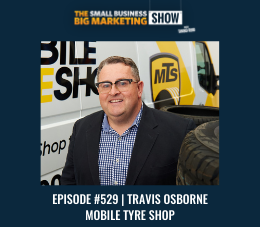
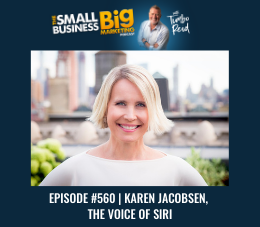
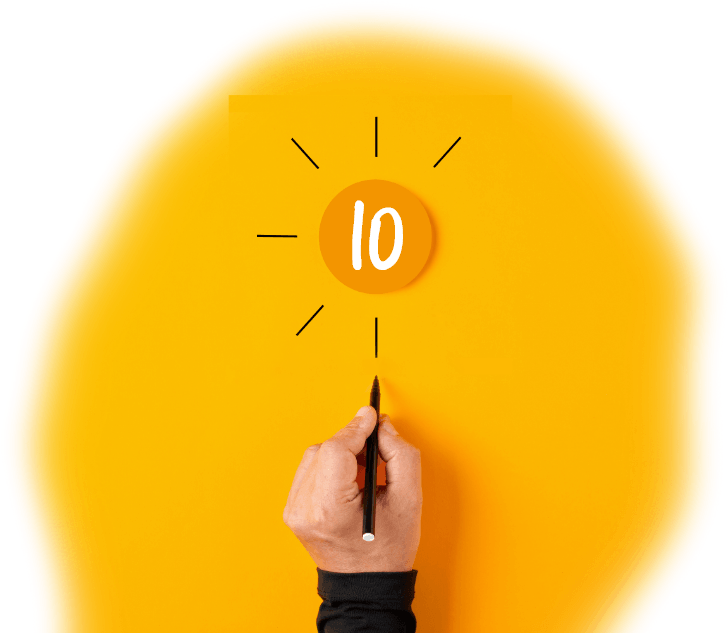
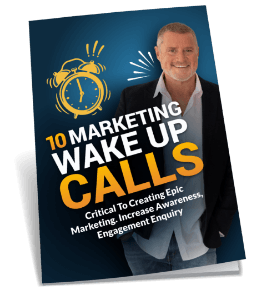
 Grab My 10 Marketing
Grab My 10 Marketing